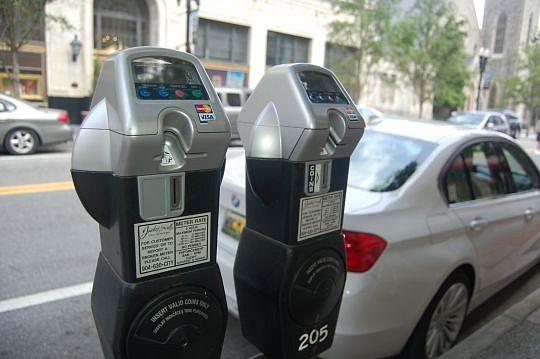
While the cost to park a vehicle in a metered space Downtown can sometimes be a contentious issue, a survey reveals Jacksonville’s fee of 50 cents per hour is among the lowest of major cities in the country.
The subject came up during budget discussions between the new mayoral administration and Public Parking Officer Jack Shad.
While it wasn’t presented as a proposal, or even a suggestion, Shad cites a survey published in 2013 by the San Francisco Municipal Transportation Agency that compared hourly metered rates in 46 cities.
The most costly parking among cities surveyed is in Chicago, where as much as $6.50 and as little as $2 per hour is charged for metered spaces.
At the low end of the range is Redwood City, Calif., which like Jacksonville, charges 25-50 cents per hour.
Two cities in Florida were surveyed. In Miami Beach, an hour in a metered space costs $1-$1.75. In Tampa, motorists drop 25 cents-$1.50 in a meter for an hour of parking.
Shad said parking rates haven’t increased in Jacksonville for about 30 years. He presented during the budget discussion a calculation of increased revenue if the city were to double the metered rate to $1 per hour at the 525 electronic meters installed Downtown. That would increase annual revenue from about $422,000 to more than $782,000.
The office more than covers its annual cost of operation with a surplus that’s placed in the Parking Enterprise Fund and used for equipment purchases and other parking management costs.
In 2014-15, total parking meter revenue was $707,887. The office’s direct expenses for salaries and benefits, meter maintenance and collections, parts, credit card fees, etc. was $381,488, yielding a surplus of $326,399.
The city budget office is projecting revenue in 2015-16 of $776,260 and expenses of $378,221 – a projected surplus of $398,039. The increase is based on more people coming Downtown who need short-term parking.
No funds have been appropriated for the parking office from the city’s general fund in the past four years, said Shad.
He said the calculation doubling the rate is not a recommendation from his office, because parking fees are not considered to be a source of revenue, even though doubling the parking rate would result in a surplus increase of nearly $307,000 compared to the 50-cent per hour fee.
“Another $300,000 won’t balance the budget,” he said.
Shad pointed out that with parking meters enforced 8 a.m.-6 p.m. Monday-Friday there are more hours of free parking than fee-based parking.
That also sets Jacksonville apart from other cities.
Among the cities surveyed, 42 of 46 enforce parking meters on Saturday and 19 on Sunday, in some cases as late as 10 p.m.
Issuing parking tickets is another function of the parking office. The fine for overtime parking — the cost of a ticket issued for a vehicle at an expired meter — also is low in Jacksonville compared to other cities.
In San Francisco, a parking ticket costs $62-$72. In Chicago, the same infraction brings a $65 fine. Miami Beach charges $18 and in Tampa, a parking ticket is $25.
In Jacksonville, the ticket for overtime parking comes with a $15 fine. That ramps up to $40 over time.
While fees for parking are not considered a source of income for the city, the fines could be an option to increase revenue. That could be a point of discussion because 30 percent of parking fine revenue goes to the Police and Fire Pension Fund with the balance going into the general fund.
This year, the contribution to the pension fund from $15 parking fines will be more than $350,000, Shad said.
The city’s revenue from parking and fines isn’t the big issue for retailers.
Creating more available short-term parking spaces is what drives business, said Roy Thomas, owner of Jacobs Jewelers along Laura Street near Hemming Park.
Thomas would support limiting parking at more meters at 30 minutes instead of the current four hours. Making someone move their car in less time opens a parking space for another customer, he said.
Thomas went into the jewelry business Downtown about 50 years ago when he leased space in the May-Cohens department store. He has seen parking rates go up and down over the years, but the time he most remembers is a time in the mid-1960s when the city decided to eliminate parking meters in hopes of stimulating business traffic.
Actually, offering free unlimited parking had the opposite effect and the meters soon were put back in operation.
“People would park on the street all day and no one could find a space if they wanted to shop,” Thomas said. “It almost drove May-Cohens out of business.”
Thomas said the cost of parking and fines in Jacksonville probably is too low, and doubling the fee would not have much effect on Downtown retail. An increase in cost and a decrease in maximum parking time might make for better business.
“I don’t think too many people care much about the cost, but they want to be able to find a parking spot near where they want to shop. Turnover is what’s important,” he said.
@DRMaxDowntown
(904) 356-2466